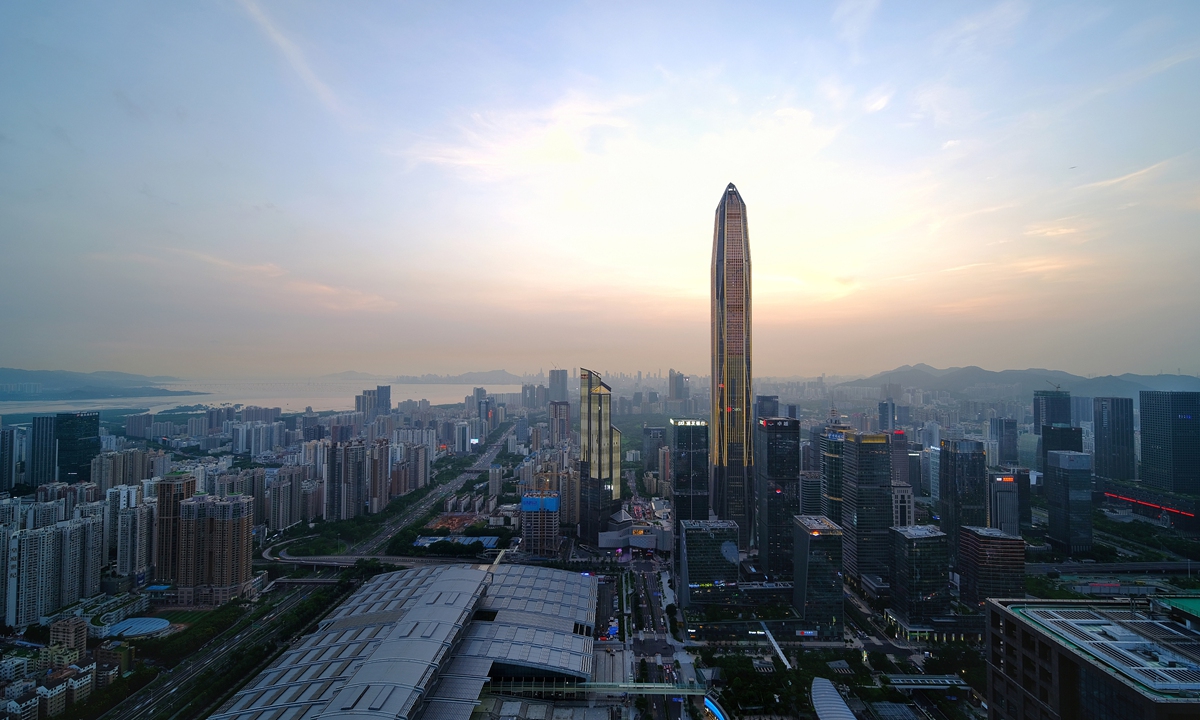China sticks to opening-up, needs homegrown tech innovations to foster quality growth
By Xie Jun Source: Global Times Published: 2020/8/25 20:43:40
Tech innovations needed to foster quality growth

A view of Shenzhen, South China's Guangdong Province Photo: VCG
Chinese President Xi Jinping described opening-up as China's "fundamental national policy" in a Monday speech, a statement that economists read as setting the tone for higher-standard opening-up despite rising US protectionism and its bid to squeeze Chinese high-tech companies.
The focus on opening-up is indispensable for China to enhance the quality of its economy, Chinese experts said, as the country still needs overseas investment to advance domestic reforms.
At an experts' forum held in Beijing Monday, Xi stressed that China should raise the level of opening up in an all-round way, build higher-level, new institutions for the open economy, and form new advantages in international cooperation.
The country also vowed to actively cooperative with any countries, regions or enterprises that are willing to collaborate with China, including US states and companies, he said.
The speech, along with the implementation of new IPO rules on Shenzhen's ChiNext stock board and the coming 40th anniversary of the Shenzhen Special Economic Zone's formation, constitute a series of recent actions by China to display its decisive stance on further opening its economy, as the country's economy now faces the headwind of rising US encirclement.
"President Xi's words show that opening-up is a matter of principle at China' s current stage of development, which is definitely not a stopgap measure," Tian Yun, vice director of the Beijing Economic Operation Association, told the Global Times Tuesday in an interview.
Xi also stated the challenges that China is facing, including a volatile external environment with the rise of protectionism, and a weak global economy battered by the coronavirus pandemic, as well as internal challenges such as insufficient innovative capability and development imbalances.
Chinese economists argued that opening up is a road China must walk down if it wants to steer its economy to high-quality development mode.
"China still has some advantages in its traditional labor-intensive industries, but the government has realized that such advantages are not irreplaceable with the ongoing shift of industry chains to countries like Vietnam. Therefore, China must develop new industries to replace the traditional engines of economic growth," said Lin Jiang, a professor of economics at Lingnan University College at Sun Yat-sen University.
To achieve the goal of developing high-quality industries, China must cooperate with global companies to make up for its technological shortcomings, although the country also should strive to enhance its ability to carry out independent innovation, Lin said.
In the speech, Xi underscored the importance of creating new growth levers through vigorous scientific and technological innovations, noting that China would enhance its capability to conduct innovation independently, and achieve rising homegrown breakthroughs in key and core technologies as soon as possible.
"China needs to introduce overseas investors and companies as a way to stimulate domestic reforms, as the entry of foreign firms would provide momentum as well as guidance to local governments on how to carry out reforms to meet international standards," Lin noted.
The economists also noted that China would reform the ways it opens up to the world, aiming for cooperation at higher, deeper levels.
For example, China would evolve from just opening aspects of its economy, such as commodities or the labor market, to amending systems to facilitate opening-up, such as certain financial mechanism reforms in the China (Hainan) Pilot Free Trade Zone.
"This would likely become the future direction of China's opening up, one of enhancing institutional and systemic openness," Tian said.
Newspaper headline: China sticks to opening-up
Posted in: ECONOMY